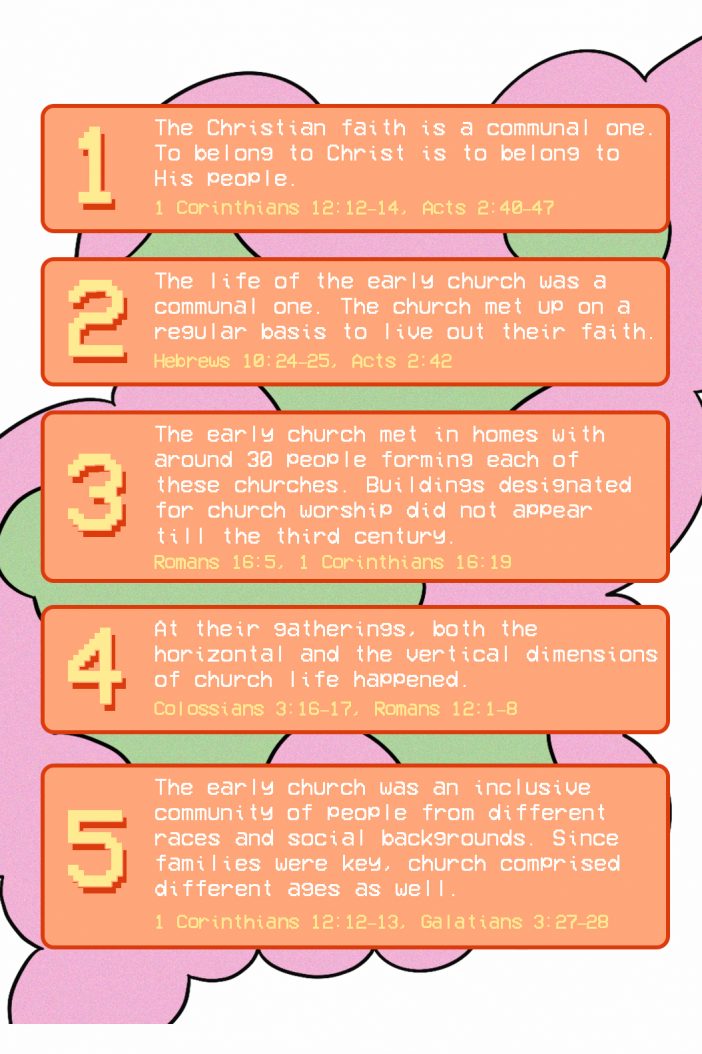Recently, I came across a fascinating article by our friends at Graceworks on whether physical church services are still relevant today.
The topic is one that is particularly pertinent to our times, especially since I imagine there’s a sizeable number of Christians who have not been back in their church buildings since COVID-19 first broke out.
The article zeroed in on one point of contention between Baby Boomers and Millennials about attending church services.
Who says they disagree?
Well, this viewpoint is derived from qualitative and quantitative data as part of The Generations Project, a study by Graceworks that aims to improve the unity within our churches by increasing empathy between the different generations.

If you haven’t already read the original article, I suggest you do so for the full findings. The team has completed its research into both Millennial and Baby Boomer Christians in Singapore, and will eventually look at the other generations.
Otherwise, here are just some of what I thought were the standout insights from the intergenerational differences raised on this topic of church services, things that I hadn’t seen or realised before.
1. OUR ELDERS HAD TO FIGHT TO ATTEND CHURCH
One of the things the report immediately brought to my attention is that for many older Christians, “attending church is a privilege and not something to be taken lightly”.
I wonder if this is my privilege speaking as a second-generation Christian, but it is helpful to simply realise that it cost our elders something to show up for church.
Many of them want to go to physical church so badly because that was where they first learned about Jesus and how to live a godly life.
Let me quote from the report:
“In our conversations with the Baby Boomers, there was a very strong sentiment that physical attendance in church is something that helps us to build reverence and awe for God and is seen almost as a way for us to ‘come back to God’.
“While Boomers recognise the value of small groups, these were perceived to be more suitable for the building of horizontal relationships among believers while one’s vertical relationship with God is better nurtured together with the larger body in ‘sacred spaces’ like church buildings and during ‘sacred times’ like formal worship services.”
That sentiment certainly rings true in my church and own personal experience.
2. MILLENNIALS FACED PRESSURE TO ATTEND CHURCH
This was another interesting point:
“The majority of Millennials, however, had an entirely different experience, especially those who were born into Christian families. They faced parental pressure in the opposite direction when they expressed their reluctance to go to church.
“Essentially, Boomers paid the price to go to church while Millennials were often chided when they wanted to skip church meetings. Combine this with technology that has put a world of information at their fingertips, Millennials no longer need to depend on their churches for ‘feeding’.”
Again, as a second-generation kid, I thought this was just something that came with the territory.
Some of my earliest memories of Sunday School are associated with the unhappy feeling of having to stop watching cartoons on Sunday morning so we could make it to church.

I never stopped to realise that my parents really associated getting me into the building with getting me closer to God. And it’s worth noting the nagging was out of love.
In a very real sense and to a very large degree, however, such a correlation does exists. Mercifully, in my case, my parents’ strategy largely worked out.
But I think it’s worth noting that with the advent of the internet, God is also present in that space of which we Millennials are natives.
What might such an acknowledgment or acceptance look like for our older generation? And how might this impact the way programmes and services are organised?
These are thoughts certainly worth chewing over for us and for our Christian leaders.
3. THE CHRISTIAN FAITH IS COMMUNAL
For many, myself included, it is often easier to choose convenience over community.
Which is why I found the article’s section on biblical reflections a sobering reminder.

We can’t shy away from the communal nature of our faith. It is what it is. We need one another.
Can that happen over livestreamed services and Zoom cell groups? I think so. Is it ideal? Probably not.
But the medium shouldn’t matter as much as the things that are core. Loving God and loving others. The Great Commission. Becoming more Christlike.
I am for whatever gets me there. And for whatever it takes for my cell mates, or my older brothers and sisters in church, to get there.
I just think the real test in all this comes when one party has to give up their preferences. Again, are we willing to do so?
4. WHAT CAN BOTH GENERATIONS LEARN?
The article rightly noted that we are “physical beings” and as such, meeting together in the flesh is good and should rightly be encouraged.
You don’t have to look far for spiritual backing — Hebrews 10:2-25 comes to mind.
What was more interesting to me was realising that we need to find out how to reorganise and recalibrate our churches so that we can have meaningful communion with God (vertical) and meaningful fellowship with His people (horizontal).
A word of caution from the researchers to our generation:
“While we support the Millennials’ emphasis on community, they do need to be careful that they don’t end up purely as peer groups, where people meet and interact with people who are just like them. They will then miss out on the intergen, inclusive nature that a church should be.”
I really love the two closing questions the article leaves the reader with.
- Are people committed to an event (Sunday physical worship) or to a community?
- Have we, as a church, structured the church in a way that makes sense to people and so helps them to come back?
If I’m being honest, I’ve not been satisfied with various expects of my vertical and horizontal experience.
It really kills me to sing at a screen, for instance. But I also dislike how much events and stuff the modern mega church seems to require. And I’m often left wondering why I don’t seem to have truly meaningful friendships in church.
Perhaps it’s a problem with me. Perhaps it’s a systemic, organisational issue. Maybe the root lies in an ugly confluence of factors we face today as the church. Who can know?

As our churches figure out the way forward, I think one thing we can do as members of the congregation is to keep our eyes on the big picture, the things that are core.
Rather than plumping for own preferences, we should let the Holy Spirit have the space to challenge us to rethink how we organise ourselves.
Honestly, it’s also got me thinking: If my attendance can facilitate or aid in my elders’ worship experience, I should not be too proud to make the sacrifice and show up.
I’m praying for humility across the generations, that we will not be too proud to put down our rights for the love of God and the love of one another.
I won’t hide behind the “digital native” narrative and excuse myself, as a younger person, from ever having to attend physical service again.
I think that is a foolish and false position, though I believe there are sadly a number among millennials today who have subtly slipped into such a view of things.
I’m praying for humility across the generations, that we will not be too proud to put down our rights for the love of God and the love of one another.
The coronavirus is a shaking after all, and that may include leaving behind certain things as we step forward into the future.
If we face them together as one church, we can be stronger for it across every generation. So, let’s not miss what God is doing today in our churches.









